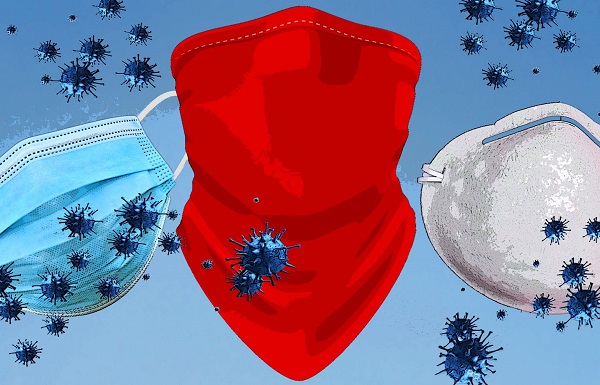
SUMMARY from last week’s answer, masks are helpful in preventing the spread of COVID-19. So far, scientific evidence suggests that the virus spreads primarily through droplets, and potentially through aerosol particles in very close quarters.
Droplets are large particles of liquid usually produced by someone who has coughed or sneezed. Because of their size, droplets usually do not travel very far before they fall onto a surface. This is how transmission can occur from a contaminated surface such as a doorknob.
Aerosols, on the other hand, are extremely small particles that are so light they can be suspended in the air for an extended period of time. In addition to being spread via coughs and sneezes, aerosols can also be released by talking or breathing. Masks primarily target droplets and aerosols- both producing it and inhaling them.
That’s why we have heard so much about the use of surgical facemasks and N95 respirators as preventive tools from COVID-19 infection. Ideally, N95 respirators and surgical masks should be reserved for healthcare workers and first responders. This is partly because there aren’t enough of these masks for everyone and also the risk of exposure is far higher for doctors, nurses and other medical staff.
Surgical masks are often blue or green with white borders. They fit loosely across the nose and mouth and shield against large droplets that come from a sick person’s cough or sneeze. It is fluid resistant.
However, they’re too loose to protect against all germs. And they can’t block the tiniest particles that may carry coronavirus. Surgical masks do not protect against aerosols and are not sufficient protection when in direct contact with COVID patients during aerosol-generating procedures.

Surgical masks are an extremely valuable piece of personal protection equipment (PPE) within the current COVID-19 pandemic. Every health worker is required to wear a surgical mask upon entering the hospital because it can help trap droplets and prevent the spread of disease when the mask wearer coughs or sneezes.
It can also protect staff from exposure to asymptomatic staff or patients who may not have been identified as having COVID-19. The mask must be discarded upon leaving the hospital, which means maintaining a sufficient supply is crucial for these facilities.
N95/ KN95 respirator masks fit tightly around the face. They filter out more of the smallest particles in the air. N95 masks, technically considered respirators, are named for their ability to filter 95 per cent of particles in the environment using static electricity. To ensure their safety and efficacy, all N95s must be tested and approved by the various standard boards and agencies.
Unlike other forms of masks, N95s are tight-fitting and have to be fit-tested for each individual. Once properly fitted, the mask should be snug and create a seal against the skin with minimal leakage, which makes it very secure and uncomfortable to wear for longer periods.
The static electricity coupled with the custom fit and minimal leakage makes the N95 an extremely effective mask. N95s are vital to protect healthcare workers providing direct patient care. Not only are they in very close contact with patients, but they often conduct procedures—such as intubations for ventilators—that increase their risk of infection by generating large amounts aerosolised particles.

Prior to COVID-19, N95s were typically used for patients with highly infectious, aerosolised respiratory diseases such as tuberculosis, and these masks would be discarded after each patient visit. Now, N95s are in such short supply that clinicians must use their respirator for the duration of their shift and have it decontaminated for reuse.
N95/KN95 are able to filter particles as small as 30 microns in diameter which means that most bacteria and viruses can be prevented from entering the body. The COVID-19 causing virus is averagely 65-125 microns so can be filtered out by N95 when worn correctly.
So to most people, cloth mask should suffice and must be worn at all times when out. Surgical masks and N95/KN95 are reserved for health workers because of their increased risk.
Source: graphic.com.gh




















